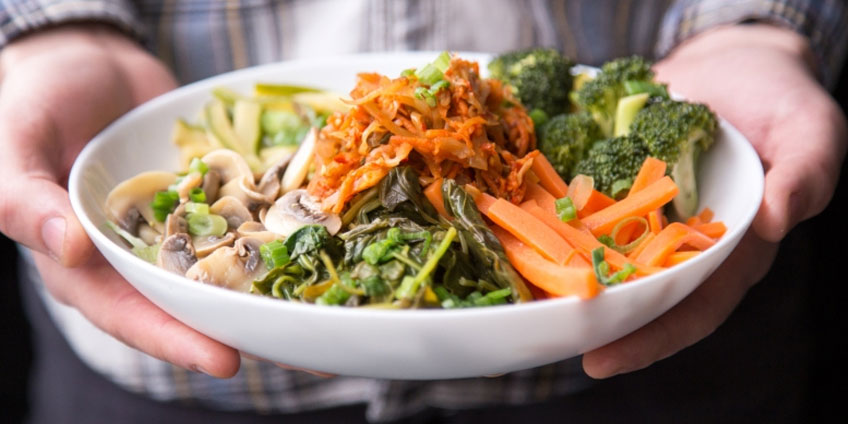Our bodies have the amazing ability to create antibodies tasked with protecting us from foreign invaders like bacteria and viruses. Unfortunately, certain triggers can spark the production of antibodies against our own healthy tissues. While a healthy immune system is a remarkable defense against illness, a malfunctioning immune system can attack and damage almost any part of the body.
Autoimmune disease is an umbrella term for over 80 health conditions that can develop through an overactivity of the immune system. As many as 23 million people – 78% of whom are women – are currently battling different types of autoimmune disease in the USA, alone. Unfortunately, this number is growing.
Why are autoimmune diseases on the rise?
Genetics, stressors, and environmental toxins are all contributing factors. What about what’s found at the end of our forks? An unhealthy diet may contribute to an imbalanced microbiome, which may negatively affect the immune system. This makes sense, since much of our immune system is located in the gut.
One example of the potential link between the gut microbiome and autoimmune disease can be found in Type 1 diabetes (T1D), a disease in which the body attacks and destroys insulin-producing cells in the pancreas. Several recent studies compared the glut flora of children with T1D to control groups children not suffering from diabetes. The results? Healthy children had much higher concentrations of friendly bacteria that help support intestinal health by producing butyrate – a fuel for the cells of the large intestine. They also had a more stable and diverse microbiome. The T1D groups’ microbiomes were much less diverse and stable and varied from each other quite a bit.
Researchers summed it up with this quote from Tolstoy’s Anna Karenina: “All happy families are alike; each unhappy family is unhappy in its own way.”
So what can we eat to help prevent autoimmune issues?
A diet full of processed foods loaded with refined sugar, flour, additives, chemicals, harmful fats, and a lack of fiber has been shown to negatively affect health and a person’s gut microbiome. Studies also show that too much meat – like the 55% recommended by the Paleo movement – may be inflammatory, have links to cancer, and shift our bacterial health from balanced to imbalanced.
Many suffering from autoimmune disease try following the Paleo diet or, taking it a step further to its stricter sister diet, the AIP (autoimmune protocol) diet. Followers of AIP remain on a modified Paleo diet indefinitely, avoiding the specific foods they are sensitive to, as well as all grains, quinoa, potatoes, legumes, processed sugars, salt, dairy, nuts, and seeds. So what’s left to eat? Lots of meat and some fruits and vegetables. In fact, many Paleo “experts” recommend that to reverse inflammation, as many as 55% of a person’s calories should come from meat.
So what’s so special about Paleo and the AIP diet?
From my perspective: AIP is a stricter version of the Paleo Diet. AIP takes a step in the right direction by including fermented probiotic foods, but it doesn’t fully address the underlying issue. I find that a diet that supports the health of beneficial gut bacteria and addresses a patient’s sensitivities is the right approach.
In my opinion, a good healing diet:
-
- removes highly processed, packaged “foods” found in the standard Western diet.
- recognizes the ways that gluten can affect autoimmune conditions in certain people.
- removes foods that can cause inflammation in certain people, like soy, dairy, or peanuts.
- addresses the individual’s food sensitivities.
Whether or not you are suffering from an autoimmune disease, a healthy diet may help support the healthy functioning of your immune system. Fill your plate with fresh whole foods, including fruits and vegetables, fiber-rich legumes, and whole grains. Microbiome prebiotic superstars include asparagus, onion, jicama, Jerusalem artichoke, leeks, garlic, radish, carrots, and tomatoes. All are packed with the perfect types of fiber needed to feed our friendly bacteria. Fermented foods like raw sauerkraut, kimchi, fermented vegetables, and kefir all contain millions of probiotic bacteria that can help to replenish the good bacteria of the microbiome.
AIP Elimination List
-
- Nuts and seeds
- Coffee
- Chocolate
- Seed-based spices (like cumin, peppercorns)
- All nightshades (peppers, paprika, tomato, potato, eggplant)
- Beans (even green beans)
- Grains (all grains, even white rice)
- Gluten
- Sugar and artificial sweeteners
- Eggs
- Dairy (including ghee and butter)
You can eat all high-quality animal proteins, all vegetables and fruit (except nightshades), coconut, lard, bacon, avocado, olive oil, salt, herbs.
Probiotic Supplementation
Taking a high quality, broad range probiotic supplement can also do wonders in supporting your gut microbiome and your health. Pasture-raised organic meats, poultry, and wild fish are an important part of a healthy diet, but balance is key. They are a great side dish to the superfoods that will nurture your little microbial friends.
Call us today to get your autoimmune testing underway!




